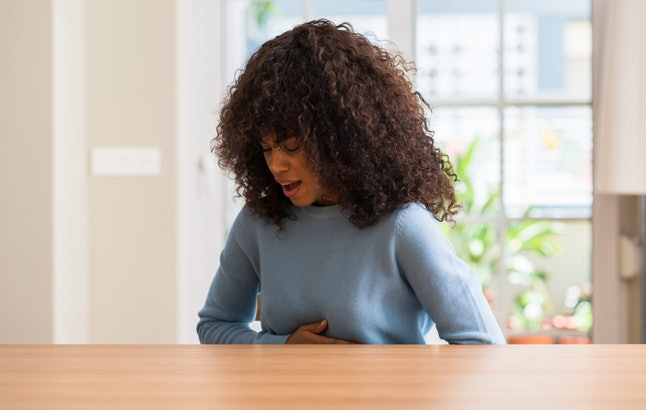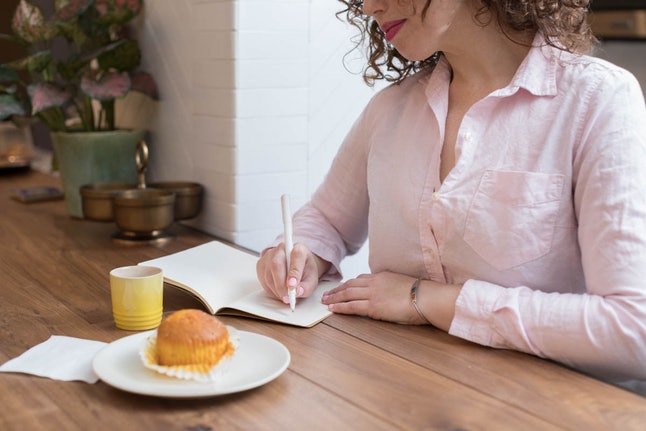If you have digestive problems habitually, you have probably tried a variety of things to take care of it, from probiotics to special dietary guidelines. Sometimes to no avail. The thing is, you may have some habits that are bad for your gut health that can seem innocent, and even totally unrelated to each other. The body is funny that way, you know?
However, it is worth mentioning, that like pretty much all things when it comes to health, there is no one sized fits all approach to anything, and that includes your gut. Dr. Erica Armstrong, MD and founder of Root Functional Medicine, tells Bustle that the most important but overlooked habit is personalizing your gut health care. That means not taking anyone else’s health advice as dogma, and paying attention to what your own body is telling you.
“An individual’s microbiome lining the gut is as unique as a fingerprint,” she says. “So blanket statements like, ‘everyone should take probiotics, or everyone should be on a certain diet’ can cause more harm than good.”
Take a look below to see if any of these familiar habits might be causing some stomach troubles. You’ll be on your way to a happy gut in no time.
1. Eating Tons Of Raw Foods

“Raw foods, high-fibre foods and high-protein foods require more work by our digestive systems to break down,” dietitian and nutritionist Hannah Magee, RD, P.Dt., tells Bustle. “While these foods are nourishing, considered healthful and often ‘innocent’ choices, too many throughout the course of a day could be playing a role in your digestive issues.”
Magee says to aim for balance. Trying to cook or steam those veggies sometimes doesn’t hurt, either.
2. Popping Over The Counter Pain Medication

While they may help take the edge off a little low-level headache, regular use of ibuprofen and other non-steroidal anti-inflammatory drugs can damage the lining of the gut health coach and digestive health specialist, Kelly Page, tells Bustle.
Next time you want to reach for an ibuprofen, Page says, try to first take a look at the factors that may have caused the pain, including stress, and lack of sleep. Try addressing those causes to fix the root of the problem, and go easy on the pills.
3. Chewing Gum

Put away that bubble gum, y’all! Lily Berman Lopez, founder of Gut Garden, tells Bustle that chewing gum is not so great for your stomach.
“Sugar and sugar alcohol substitutes have digestive side effects such as bloating, gas, cramping, and diarrhea. They also inhibit growth of beneficial gut bacteria,” she says.
In addition, to that, chewing prepares your body to digest food. “It releases digestive enzymes and stomach acids in preparation for a meal that never arrives, resulting in heartburn for many people,” she says. Pass on the gum and go for a breath mint instead.
4. Adhering To A Restrictive Food Plan

While everyone has the right to figure out the types of foods they like and what makes them feel the best, Magee says that one habit that isn’t often thought of as harmful, but can negatively affect digestion is following a restrictive food plan.
Magee says what when people put a lot of restrictions on what they eat, they constantly think about what they’re going to eat and if it fits their so-called “diet rules.” This behavior can be anxiety inducing (and potentially a symptom of disordered eating), which can affect how well someone processes what they’re eating.
“What some people don’t know is there exists a connection between our brain and our gut, and the two are constantly communicating,” says Magee. “This is referred to as our gut-brain axis. When we experience worrisome thoughts about what we’re eating, or emotional distress around food, our gut-brain axis is at work.”
Magee says that unless they’re medically necessary, it’s important to be flexible about where you get your nutrients from, and remember that food is fuel.
If thoughts about restrictive eating are getting in the way of your ability to enjoy food, or if they are becoming a source of anxiety, talk to your doctor.
5. Forgetting Your Water Bottle

While it might seem like no big deal to forget the hydration habit for a day or two, drinking enough water is a crucial part of maintaining good digestion and gut health Lisa Richards, creator of The Candida Diet, tells Bustle.
“Staying hydrated allows your intestines to function properly,” she says. “Your gut needs water to keep food waste moving through your body.”
Even if it means writing a little note for yourself as a reminder, make sure you are keeping hydration in mind throughout the day.
6. Going Overboard With The Probiotics

Sometimes too much of a good thing can backfire, says Dr. Armstrong. And yes, that rule applies to sauerkraut and supplements, as well.
“While probiotics can be very good for some people, especially after being on antibiotics, taking and eating probiotic foods can also lead to too much bacteria in the first part of the intestine,” says Dr. Armstrong. “This can lead to bloating and stomach discomfort with eating, inflammation in the gut, IBS symptoms, and the feeling of brain fog.”
Similarly, many people have yeast overgrowth in their gut, she says. For them, drinking Kombucha, for example, although marketed as probiotic, may worsen their problem.
“People with yeast overgrowth should be avoiding fermented and yeasted foods,” says Dr. Armstrong. Before you try to add anything new to your supplement routine, check in with a health professional, especially if you are having some issues.
7. Having An Inconsistent Sleep Schedule

It all comes back to sleep, doesn’t it? Having a regular sleep habit and making sure to get all your hours in can definitely impact how your stomach is feeling and working.
“Sleeping with a consistent bedtime and wake time affects the balance of good bacteria in your gut,” says Dr. Armstrong. So try your best to get that rest.
While gut troubles are a friend to no one, taking a look at some of your habits might be a great way to start on the road to a good gut. A happy tummy is totally possible.
Source: Bustle









































![cb302073-4d92-487d-8085-6e8bd9573317-stock_ab-8896[1]](https://healthanswersreport.com/wp-content/uploads/2019/05/cb302073-4d92-487d-8085-6e8bd9573317-stock_ab-88961-696x392.jpg)





